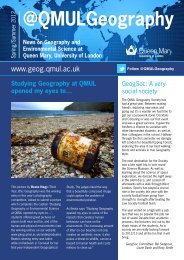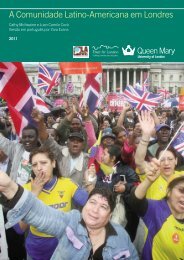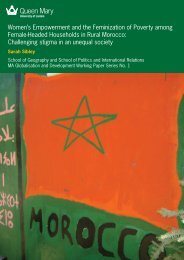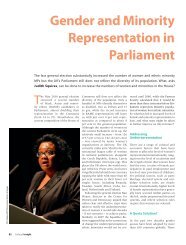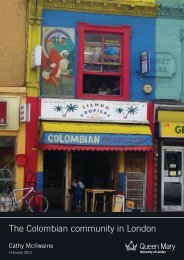Gender and Ethnic Identities among Low-paid Migrant Workers in ...
Gender and Ethnic Identities among Low-paid Migrant Workers in ...
Gender and Ethnic Identities among Low-paid Migrant Workers in ...
- No tags were found...
You also want an ePaper? Increase the reach of your titles
YUMPU automatically turns print PDFs into web optimized ePapers that Google loves.
that: “I am com<strong>in</strong>g here to work <strong>and</strong> I can work legally as a citizen of a member state of the<br />
European Union, while others often are here because of prosecution or had to escape war.” Another<br />
Polish worker, Adam noted the conflict <strong>among</strong> Eastern Europeans, <strong>and</strong> especially with Lithuanians:<br />
“Also there is a sort of bitterness between Polish <strong>and</strong> Lithuanians. I th<strong>in</strong>k they are try<strong>in</strong>g to prove<br />
that are as good as Poles”.<br />
While Poles were often stigmatised for under-cutt<strong>in</strong>g already low wages, migrants also highlighted<br />
more subtle ethnic differences. Ab<strong>in</strong>a, a female Ghanaian care worker said that Ghanaians were<br />
much superior <strong>and</strong> better suited to care work than Nigerians, <strong>and</strong> as a result their clients always<br />
preferred them: “Nigerians are always hard like, they want<strong>in</strong>g to do, they want you to like, th<strong>in</strong>gs to<br />
be done the way they want it. Ghanaians are calm, they try to take their time to do th<strong>in</strong>gs”. Most<br />
migrant groups stressed how hard they worked, not just as migrants as noted above, but also<br />
compared to other ethnic groups seek<strong>in</strong>g thus to emphasise their own value <strong>in</strong> relation to workers<br />
from other groups. Thus, like Mirek’s comments about the Poles <strong>in</strong> construction, Jose said that the<br />
Brazilians were the hardest workers <strong>in</strong> the same sector. <strong>Migrant</strong>s also noted how they worked<br />
harder than the English, reflected <strong>in</strong> Artur, a construction worker’s comments: “<strong>in</strong> general English<br />
work less, <strong>and</strong> Polish work more, although they may have the same position”.<br />
Interest<strong>in</strong>gly, women migrants appeared to be less likely to comment negatively or to boast of their<br />
prowess as workers belong<strong>in</strong>g to a particular ethnic group than men, perhaps l<strong>in</strong>ked with male<br />
migrants’ need to cope with the potentially emasculat<strong>in</strong>g effects of their work <strong>in</strong> female-dom<strong>in</strong>ated<br />
sectors as well as the poor work<strong>in</strong>g conditions they faced. Therefore, the comments made by<br />
Sylwia, a Polish chambermaid were common <strong>among</strong> many female migrants: “We did not m<strong>in</strong>d<br />
where people come from. We would sit together <strong>in</strong> the canteen; there would be a black girl, a<br />
Russian <strong>and</strong> Polish girls. There wasn’t this division accord<strong>in</strong>g to nationality”. Indeed, some of<br />
women <strong>and</strong> men that we <strong>in</strong>terviewed stressed that it was easier to make friends with migrants from<br />
other ethnic groups than with British people <strong>and</strong> that work was important as it presented an<br />
opportunity to learn about other ethnic groups. It is also important to note that there were also<br />
divisions with<strong>in</strong> ethnic <strong>and</strong> nationality groups with several migrants compla<strong>in</strong><strong>in</strong>g about their own<br />
people (see also McIlwa<strong>in</strong>e 2005). Angela, a Portuguese cleaner, for example, said that the<br />
Portuguese were ‘gossipers’ <strong>in</strong> the workplace <strong>and</strong> that you had to ma<strong>in</strong>ta<strong>in</strong> your distance <strong>in</strong> order to<br />
ga<strong>in</strong> respect from them. In a similar ve<strong>in</strong>, Ewa, a Polish hotel worker said that Poles rarely helped<br />
each other out if they were not close friends beforeh<strong>and</strong>, especially when someone has first arrived.<br />
19




